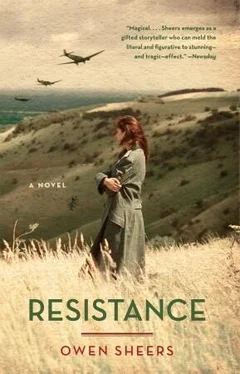Over the past five years Albrecht had travelled through countries, over seas, and into countless sectors of unknown territory, and yet this short walk over the Hatterall, no more than an hour, had felt the most adventurous of all his expeditions. This sensation was accentuated when they descended the other side of the ridge and the Llanthony valley began to open out before them. After his months in the Olchon, after all the days waking to its familiar shape and character, this suddenly different view invigorated him. The interlocking spurs of the high-backed hills gave the valley a folded appearance, while the broad glacial floor was patched with rich alluvial fields. Compared to the deep notch of the Olchon it was more open, more gentle, and, with the ruins of the priory settled within it, more resonant with the mark of human hands. Albrecht felt like a Victorian explorer stumbling upon a hidden discovery. He knew, however, he was discovering nothing more than the depth of his own retreat these past months. The extent to which, apart from that brief motorbike ride out of the valley, he’d shrunk his world to a scale he could know and control.
The ruins of the priory were impressive. A great wrecked ship of a building run aground on the valley floor. A morning mist hung low about its walls. Many of its arches and long windows were still intact, framing the hills opposite and lending the ruins a beguiling impression of both order and chaos, of studied construction and natural decay. Its ragged towers and fallen walls emerging from the mist reminded him of another priory he’d seen in France. That too had been a ruin when he saw it, but its remains had risen out of grey smoke, not mist. The priory had been used as a dressing station and in its crypt they’d found more than a hundred wounded men. Only the low grind of their moaning indicated that some of them were still alive. In the chancel Albrecht had found a statue of the Virgin fallen from her pedestal, her head resting on a pillow of shattered stone and dust. The paint on her face was chipped below her eye in the shape of a tear. Albrecht was not a religious man, but at that moment he’d been willing to believe that someone, somewhere, was crying for what they had done.
“My father said Landor wanted that path t’be a road right over to Longtown.” Sarah was still looking in the direction of Landor’s house. “But he never got it further than that field.” Albrecht traced the path away from the trees to where it faded and petered out into a grassed depression, then nothing.
The walk over the ridge seemed to have energised Sarah too. There was a new animation about her that lit her features. Every time Albrecht looked across at her it took some effort to make himself look away again. She had, he supposed, been away from the valley of her birth for a long time. While they sat on the stile she told him what she knew about its history.
“That’s the Honddu,” she said, pointing towards the river meandering between the spurs of the hills, shining metallic in the first light of the morning. “Means ‘black water.’ ” Sarah lowered her hand. Albrecht felt her shift her weight on the stile beside him. She scratched her calf with the toe of one of her scuffed boots. She seemed nervous.
“They say St. David came here. Down there, where the chapel is, see? That’s where he had his cell. He came here late on, when he was old,” she added before pausing again. Albrecht thought of the orphan lamb, awkward in its unfamiliar skin.
“William de Lacy built the chapel. He was a Norman knight. Came into the valley on a hunting trip an’ never left. The priory came later. Didn’t last long, though. Locals wouldn’t leave the monks alone, so they left in the end.”
Albrecht began to feel uncomfortable too. She’d never spoken to him like this before. She’d never offered so much of herself. Was she trying to tell him something? This valley and its history was, after all, a graveyard of failures, littered with the remnants of men foolish enough to think its geography sufficient to extract themselves from the world.
What Albrecht didn’t know was that ever since their walk back from the Red Darren yesterday Sarah had been mining her memories for everything she’d ever been told about the valley by her father, Mrs. Thomas, and the poet. It wasn’t that she wanted to impress Albrecht. It was more important than that. He’d shown her the map, he’d explained its secrets to her, and now she wanted to be able to guide him in return. She wanted to be his equal, to show him that although she had none of his studying, she could still navigate the history of this living map below them.
“The old monastery, where David Jones lived with Eric Gill and the others? That’s further up. You can’t see it from here.” Sarah was careful to use their names. To call them as she always thought of them, as simply “the artist” and “the poet,” seemed childish now. And she did not want to appear a child to him. This was her valley and she wanted to reveal it with all the authority and love with which he’d translated the map.
Albrecht nodded in response to Sarah’s observations, interjecting now and then with, “I see, yes,” or just a murmur of understanding. She said nothing he didn’t already know. The books he’d obtained in Oxford had already told him everything she mentioned, and more. In a history of the valley he’d read the original extracts from Giraldus Cambrensis, who’d first referred to the tradition of St. David’s Cell. The biography of Landor he’d been reading at The Court had described how William de Lacy, sick of the trivialities of the royal court and seduced by the valley’s isolated beauty, had resolved to restore the squat chapel below them and take up a life of contemplation and prayer. And from a recently published walking guide to the Welsh Marches he’d learnt how the monks had been harried from their cloisters by the lawless peasants whose ancestors had, no doubt, earned the valley its other name of the Vale of Ewyas, from the old Welsh word gwyas , meaning “a place of battle.”
The sun was rising. The people in the valley below would soon be stirring. “And that is where Landor built his villa?” Albrecht said, pointing once more to the trees at the end of the overgrown track. He looked down at the cows moving in and out of the ruined priory.
“It’s all right,” Sarah said, getting off the stile. “They’re beef, not dairy. We’ll be good for a bit yet.” Turning away from him she began walking across the open field.
Albrecht was suddenly panicked. Years of battle had left him with a natural wariness of such open pieces of land, even though it was now just the eyes of strangers he feared, not bullets or mortars. But those eyes could still be lethal. They could still take it all away. And that’s why the panic fluttered in his chest. Because he did not want to lose her now. Not after so long, not when he could sense them becoming closer by the day. He slid off the stile and followed her, looking anxiously down at the ruins and the farm beside them, ready to retreat back into the woods at the first sign of life.
Over the long winter nights of reading his biography by the fire in The Court, Albrecht had grown fond of the eccentric and rebellious Walter Savage Landor. He somehow thought he understood what fuelled the eclectic gentleman poet who’d bought an estate in this valley with the vision of creating a feudal Utopia; the energetic dendrophiliac who’d planned to plant ten thousand Lebanon cedars on the bare Welsh hills. The ruins of his house were, therefore, a disappointment to Albrecht, and a sorry monument to the man and his ill-fated dreams. A few free-standing piles of fern-topped stones and four broken-topped walls of brown red sandstone round a square of bare earth was all that remained of the villa Landor never saw finished. The ground within the walls was shot with nettles and cut up by the hooves of sheltering cattle. The unfinished cellar beneath these walls was dank and thick with the smell of sheep droppings. The only roof was provided by the trees; saplings when the foundations were laid. These at least, Albrecht thought, would have pleased Landor.
Читать дальше












